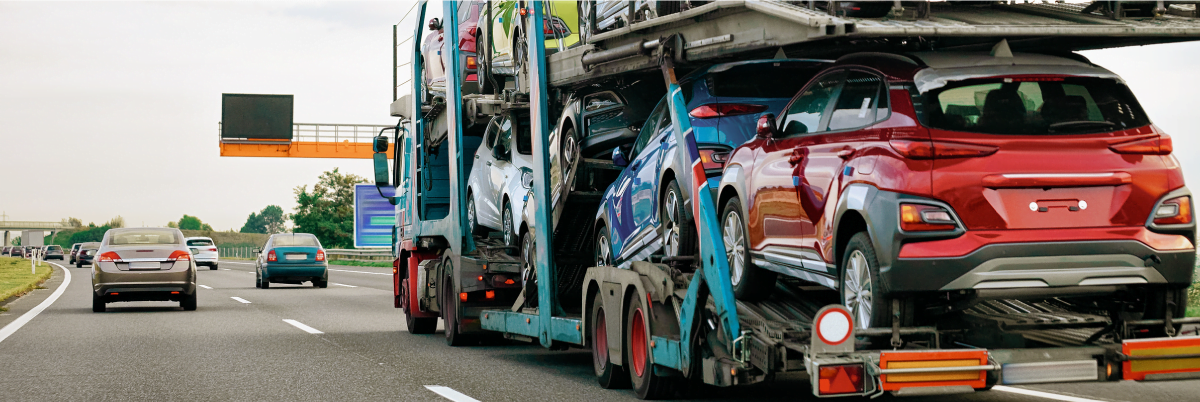
VEHICLE SHIPPING INSIGHTS:
WHAT YOU NEED TO KNOW TO APPROACH VEHICLE SHIPPING WITH CONFIDENCE
Ready to take your first steps toward auto transport? Read our comprehensive guide before you begin.
You’ve probably seen one of the many open semi-truck trailers loaded with cars going from A to B. Whenever you do, you’re watching vehicle shipping in action. Many people have faith in this service, which is driving a booming sector currently worth $12.8 billion.
Sometimes vehicles are carried within the state, or it may be a cross-country trip. Some send their car ahead to a different country. If you think this sounds nerve-wracking, it’s time to become familiar with how the important process of auto shipping works.
Skipping car shipping can impose real-world costs and risks whereas investing in it can prevent several expensive outcomes. A good auto transport company will save you time while a bad one can needlessly complicate things. Most importantly, auto transport should provide owners with peace of mind.
This guide applies to anyone looking to ship a car, for any reason, and at any time. We’ll break down why vehicle shipping matters, what customers should know about the process, and how to get the most from it by choosing a reliable auto transport broker.
Vehicle shipping 101
Everybody understands the basic aim of auto shipping: Get the vehicle from the pickup point to drop off as quickly, safely, and cost-effectively as possible. The process diversifies based on the customer’s reasons for shipping.
You can quickly tell if shipping your car makes sense based on your needs, which can include:
- Moving interstate or cross-country: Relocating for a new job or a simple change of scenery can require auto shipping. A journey of as few as 50 miles can qualify for the “cross-country” tag and quickly become an exhausting and potentially dangerous drive best handled by transport professionals.
- Owning a dealership: A mid-2021 McKinsey report revealed that car purchases are picking up again and buyers are increasingly reluctant to interact with dealerships in person. This means dealers must get cars to the customer under their own steam, making auto shipping an excellent solution.
- Long-distance purchases: Finding your ideal car through an out-of-state seller is common, and many close the deal via the internet. Knowing how to buy online safely is the first step to getting your e-commerce purchase successfully shipped.
- Leaving for (or returning from) college: College departures take special preparation. College-age drivers are under study stress, typically less road-experienced, and more likely to be under the influence of substances that impair their driving performance. Vehicle shipping solves these problems and keeps students safe.
- Vacations and holidays: Auto transport can take the hard work out of going on vacation by delivering your vehicle to your destination while you take a more relaxing route there.
- Retirement: Retirement often comes with relocation or more frequent journeys to new places. Retirees must remember that their age becomes a diminishing factor in their road safety, particularly on longer trips. Car shipping keeps everyone safe without compromising the freedom of retiring.
Selecting the right carrier type is next. Open carry trucks are the most used since they’re more affordable and readily available. The downside is your vehicle is more vulnerable to the elements, road debris, or potential theft.
Enclosed vehicle shipping is a good year-round solution that sees the vehicle protected from those risks, but the added peace of mind costs extra. Lastly, there’s flatbed shipping — the most expensive option — reserved for heavy-duty and oversized vehicles. This higher price point buys a driver with the specialized skills necessary to maneuver awkward loads.

Choosing a high-quality vehicle shipping company
Auto transport didn’t become a multi-billion-dollar market by having a shortage of shipping companies. Plentiful options make it difficult to choose quality providers for your vehicle needs. The good news is that taking a few simple steps helps:
- Read reviews and testimonials: You should use reviews and learn how to spot fake ones. Search for carrier candidates on sites like the Better Business Bureau and study their website and social media to see how, or if, they interact with the public.
- Call companies directly: One-on-one communication helps gauge an auto carrier by learning how they can meet your needs (especially if you’re shipping internationally). You can also ask about their licensing and certifications, safety record, insurance status, and time in business.
- Speak to experienced brokers: Brokers have a go-to list of reliable carriers whom they can confidently recommend to customers depending on their auto shipping needs.

Your quick guide to the vehicle shipping process
Prepping your vehicle for shipping is a multi-layered process. A big part is learning how to inspect your vehicle before and after shipping to spot things early for faster insurance solutions. Other important steps include:
- Clearing the car of valuables
- Checking for leaks to prevent being charged for harm to the carrier’s rig and/or other vehicles in transit
- Cleaning the vehicle externally to make transit damage easier to spot
- Keeping fuel below a quarter tank to reduce weight
You may then opt for door-to-door or terminal-to-terminal shipping. Door-to-door can be as convenient as it sounds (provided your A and B locations allow it) with the caveat of paying for the driver’s added time and effort.
Terminal-to-terminal lets you drop your car off at a carrier terminal and pick it up at one later. It’s a flexible option but it’s also more expensive. It leaves the vehicle more vulnerable to risks and incurs terminal storage fees at both ends.
This is a basic overview and not specific to any single company. Each transporter has its own policies, so speak to them about specifics.

How much does vehicle shipping cost?
The average costs to ship a car can range from $700 to $1200 at a roughly estimated cost of $0.60 per mile. Putting a universal price tag on auto shipping isn’t possible as there are always multiple factors at play.
For example, the time of year can have a big impact on cost. Winter is generally less expensive due to lower fuel prices and fewer people needing auto shipping. The industry tends to move faster in the summer but is also busier, so carriers will raise their prices accordingly. Other factors are:
- How far your vehicle must be carried
- Current national rates
- Selected shipping type
- Route complexity
- Vehicle dimensions
You may have a significant amount of influence over your final bill depending on the model of your vehicle and how flexible your schedule is. If you’re in a time crunch to relocate or own a classic or exotic car, you may have to settle for a bigger bill.
Understanding the main factors in auto shipping is a good way to prepare for expenses, as is learning about the hidden costs in transportation quotes.

4 ways to get the most from your vehicle shipping experience
There are several ways to get the biggest bang for your shipping buck. Here are four of the most effective:
- Be as flexible as possible: You’re in a strong position if you have the luxury of choosing when you ship. This means you can wait a week (maybe even a month) or two if it allows you to take advantage of cheaper carrier rates.
- Be wary of price poles: It can ultimately cost more to use the cheapest carrier than it would the most expensive. Judge carriers by record and credentials before price point.
- Ask about potential discounts: Your personal status in terms of your job, your age, or whether you’re a first-time or return customer could make you eligible for lower rates.
- Keep your vehicle as empty as possible: Make sure there’s nothing in your car that’s not essential to its function to make it lighter and thus less expensive to ship.
Working with a reputable provider can help you consider multiple carrier offers for the most cost-effective experience possible. In the meantime, read our blogs on car shipping savings and even more cost-cutting tips for further insight.

10 FAQs that come up during vehicle shipping
Here are some of the most common questions asked about the auto transport process:
- Can’t I handle vehicle transport by myself??You could if you’ve factored expenses for gas, tolls, snacks, rest stops, and potential damage to the vehicle. There are significant physical and financial risks involved with long-distance driving that can potentially make whatever you save by avoiding auto transport seem minimal. Consider these dangers carefully.
- What’s the difference between an auto transport broker and a carrier?Learning how brokers and carriers differ is key to unlocking many benefits. A broker can save you a great deal of time, money, and frustration by providing a pre-approved roster of reliable auto carriers who’ve been vetted for quality performance, necessary skills, and credentials. Brokers can also help you steer clear of auto transport scams.
- Out-of-state shipping seems prohibitively expensive. Should I avoid it?Buying and shipping an out-of-state vehicle doesn’t have to break the bank. Check out our pro tips to make it as cost-effective as it can be without cutting corners on quality delivery.
- How long does shipping take?Many factors can influence your vehicle’s arrival time. These include seasonal weather, random weather patterns, and on-road accidents. Our general ETAs prior to carrier selection are:
- 0-500 Miles: 1-2 Days
- 501-1,000 Miles: 2-3 Days
- 1,001-1,500 Miles: 3-5 Days
- 1,501-2,000 Miles: 4-7 Days
- 2,001-2,500 Miles: 7-10 Days
- 2,500+ Miles: 10-14 Days
- Is contactless car shipping available?This is in demand because people have health concerns or other personal preferences. There’s also the rise in online shopping reducing the consumer’s need and desire to physically visit a dealership. Ask your auto dealer and carrier if they can accommodate low-to-no contact vehicle shipping.
- Can I ship vehicles out of state?Yes, however, the longer journey will require some deeper thought on the right carrier and transport type for the job.
- Can I ship vehicles internationally?Some shipping companies are able to take your vehicle anywhere in the world, while some will have limited international options, and others will only ship within the United States (which may or may not include its outlying territories).
- Can my car be delivered to my house?Door-to-door shipping is designed to drop your car at your house. Things get more technical when it comes to factors like how closely your street layout allows a large auto carrier to maneuver to your home. The carrier may well fit and drop your car on your doorstep, or it may have to be dropped off at the nearest point logistics will allow.
- Can I have a car delivered to another location?Typically, yes, as this may be the likely solution to picking it up. Vehicles can be dropped at a pre-arranged point or delivered to a place of business. Consult with your carrier to explore delivery options.
- Will I get auto transport updates?A good auto transport broker will provide a continuous line of communication between you and your chosen carrier. This way, you’re always informed about your vehicle’s progress in transit.
The final word on car shipping
There’s a lot for customers to consider when shipping a vehicle. It’s the carrier’s job to make things as stress-free, affordable, and easy to understand as possible.
Your chances of achieving these benefits are greatly increased when you work with an auto transport broker who can advise you on how shipping variables will influence your unique shipment. Reputable providers are a cut above the rest, and this is where Mercury Auto Transport excels.

The experts for auto transportation
Mercury Auto Transport is a full-service auto shipping broker specializing in connecting customers with carriers nationwide. Our team of experienced agents is dedicated to demystifying the shipping process and making pricing transparent. We don’t take a deposit until you and your chosen carrier have finalized a price, and we never impose additional costs, cancellation fees, or surcharges.
We’re fully licensed and bonded with the U.S. Department of Transport and the Federal Motor Carrier Safety Administration. Our licenses page lets you review our insurance and inspection history, related safety records, and more. We proudly hold 5-star customer reviews with the Better Business Bureau, Google, Facebook, and Transport Reviews.
Mercury Auto Transport puts you and your vehicle first. Call us toll-free at 800-553-1828 or email info@mercuryautotransport.com to request a quote or speak to a representative. We’ll make car shipping a safer and more cost-effective experience.